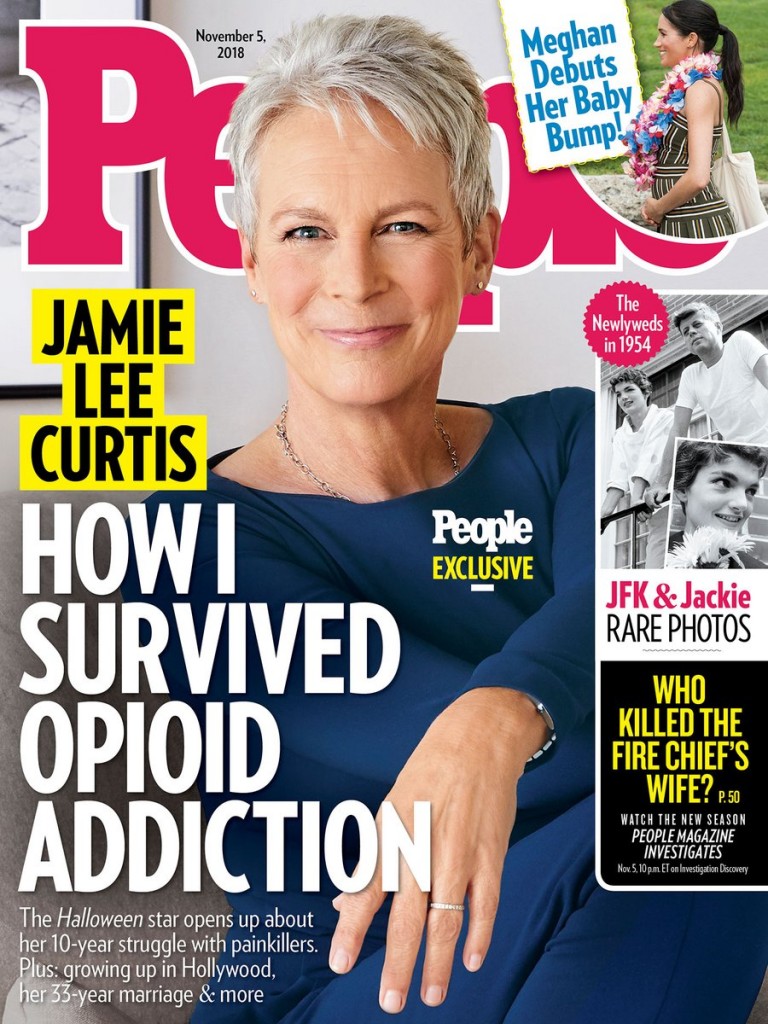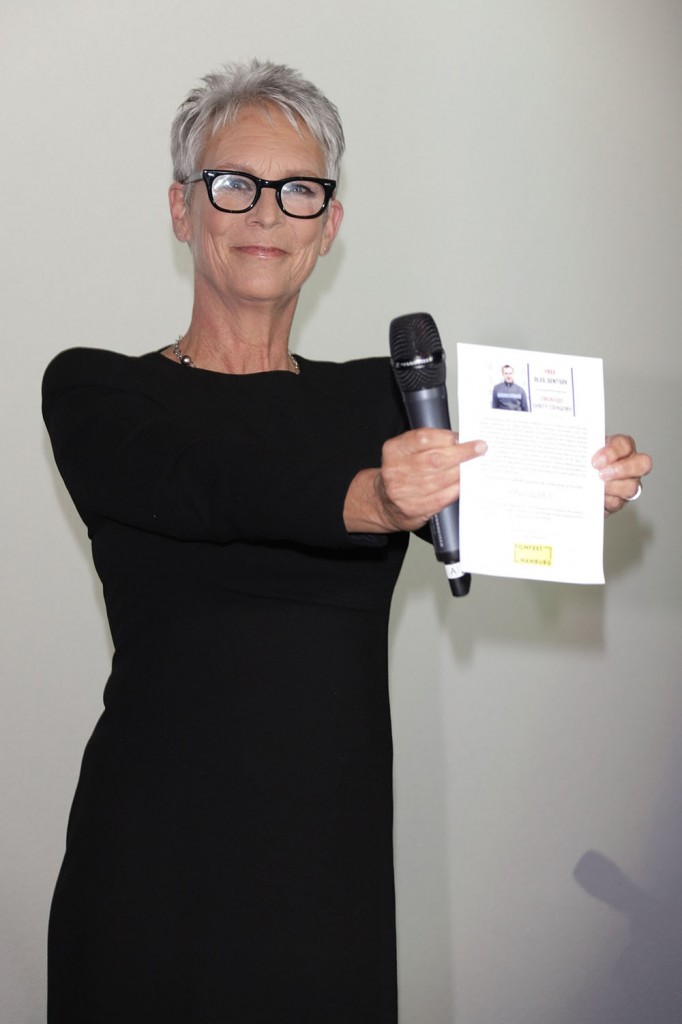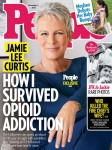
The lovely Jamie Lee Curtis is on the promotional trail for Halloween. Given the horror flick’s incredible opening weekend, the movie doesn’t need much help. Jamie is on the cover of this week’s PEOPLE. In her interview she discusses her 10-year struggle with painkillers, which she been open about in the past. She recently called getting sober em>“the single greatest accomplishment of my life.” Jamie admits that her battle with drugs almost took her down. As she told the magazine, “I was ahead of the curve of the opiate epidemic,” adding, “I had a 10-year run, stealing, conniving. No one knew. No one.”
Jamie’s struggle began when she was prescribed painkillers following plastic surgery in 1989 for her “hereditary puffy eyes.” She began getting drugs by any means necessary, including stealing pills from her sister Kelly, who found out about Jamie’s addiction in 1998. On February 3, 1999, Jamie came clean to her family and attended her first recovery meeting. She’s been sober ever since and still goes to meetings, for herself and to support other addicts. Here are some highlights from the interview:
On her sister finding out about her addiction:
“I knew she had them in her suitcase in our guest room closet. I basically took all her opiates. When she was leaving I knew she would pack her suitcase and find her pills missing. I knew I had to acknowledge to her what I had done, and so I wrote her a note and left it on her suitcase. I came home that day, and she put her arms around me and told me she loved me and she was concerned about me and she was unwilling to watch me kill myself.”On addiction:
“The shame involved with it is tremendous. I have worked very hard to remove the shame of it and just acknowledge I’m human. What makes recovery so special is that it’s one addict or alcoholic talking to another. It’s really about letting go of the secret in a safe way and then finding treatment programs that work for you.”On getting sober:
“I’m breaking the cycle that has basically destroyed the lives of generations in my family. Getting sober remains my single greatest accomplishment…bigger than my husband, bigger than both of my children and bigger than any work, success, failure. Anything.”On recovery:
“In recovery meetings, anyone who brings up opiates, the entire room will turn and look at me, because I’ll be like, ‘Oh here, talk to me. I’m the opiate girl.’ We’re here to relate to each other. We’re human. We’re all trying to figure this out—all of us.”
I can very much relate to Kelly, as I had a family member in the throes of addiction steal pain pills from me. I’m so glad that Jamie has been able to triumph over her own personal demons and serve as an inspiration for others. Jamie turns 60 in less than a month, on November 22. She’s goals in so many ways.
Photos: Getty, WENN, Instagram
















Wow, I didn’t know about this. I’m glad she shared her story.
My grandma has had that surgery (Probably it’ll be in my future if it affects my vision) and a good friend just had it at 56. The recovery took FOREVER and was so painful in these two instances. I’ve not been around plastic surgery recovery other than them, but it makes me never want to do it.
Absolutely! I was surprised by how much pain it really is and that this isnt really “known” or discussed…. as common or desired as corrective surgery is and all. I developed such respect for women who have multiple things done– not that its necessarily great, but, the pain must be intense. I had just one minor thing done and that was pretty bad!
She’s such an inspiration and joy
Good for her. The stigma around opioid addiction needs to end.
I had arthroscopic surgery on my knee a few months ago (I was in and out the same day) and the hospital gave me a prescription for about 40 opioid pills. I took one the first night to make sure I slept and because I thought if they gave them to me, I should take one, that they knew what they were doing. But I didn’t really need it and didn’t need any of the others. I was terrified of them and eventually took them back to the pharmacy to turn them in. I was afraid someone would break into my home to get them from me.
Jamie is an inspiration! I’ve said this on this site many times but I have struggled with benzodiazepine addiction for 17 years. The horrible shame from addiction is absolutely unbearable. If it wasn’t for my husband’s love and support, I wouldn’t be alive today. I’m so glad that Jamie is speaking so openly about her addiction and recovery. It will help so many people that struggle with addiction!
I’m bipolar and I take Ativan for sleep, anxiety and mixed mania episode break through.
I’m well aware that it can be addictive and really limit myself and take it as needed when things get bad.
I’m really curious how you were taking it when you got addicted and how you knew you were.
Mainly I’m trying to avoid the pitfalls
Mine didn’t start with a prescription. I was very anti-drug (except for weed) throughout my life until I fell into the wrong crowd and got raped. I started taking xanax recreationally (from drug dealers) when I was 20 to numb myself and ever since then it’s been a struggle. I hate alcohol so benzos seemed like the next best thing. As soon as I took my first xanax, I was done for. I was addicted immediately because it numbed me and made my mental anguish go away. It was like when a heroin addict says they got hooked the first time they shot up. When I couldn’t get xanax, I would take any benzo I could get. Klonopin, Ativan, Vaium…..all of them. I wish I would have stuck by my anti-drug stance but I didn’t have any support to help me through my rapes/traumas. Just be sure to stick strictly to your prescription directions. Benzos should only be taken long term if you have epilepsy or if you take it as needed for panic attacks etc. Please be very, very careful and never stop taking them cold turkey as it may result in severe withdrawal. I have suffered severe withdrawal from them and almost died from the withdrawal induced seizures. Benzos are nothing to play with. Thank you for reaching out to me to ask me questions. I wish you all the best!
If anyone wants to learn more about how the opioid crisis started and what it’s cost citizens, local governments, and society, I would highly recommend “Dopesick” by Beth Macy.
It’s on my to be read list. Thanks for the reminder!
Its great to see her talk about this. I dispense opiates all day long at my pharmacy and I struggle every single time with whether it’s appropriate to dispense. There are many reasons for the crisis we are in, but irresponsible prescribing is certainly one of them. A lot of people become addicted after routine surgery, accidentally. I place a lot of that blame on excessive prescribing, excessive quantities and dosing. The company I work for has taken a firm stand on dispensing requirements, and I can only hope we are making a positive impact. I will say that prescribers are not responding well to CDC guidelines for opiate dispensing, which isnt helping. The stigma is real, and it’s awful and it’s hard for me to not become jaded.
Not to be rude, but it’s really none of your business. It’s between the patient and the doctor. You’re job is to fill prescriptions not pass judgement on whether or not the patient needs them.
That may be true but pharmacists are the first defense in noticing which doctors over prescribe opiods.
We have been told that all pain is bad and therefore you shouldn’t have to suffer ever and there’s a pill for that. Some pain is good bc the body is sending signals. (For some people) It’s healthier in the long run to exercise and address posture and diet than be on long term pain meds, building up tolerances and destroying your liver/kidneys.
You’re right, its is between the doctor and patient. But what happens when the doctor is prescribing irresponsibly? There are guidelines that the CDC and various boards of medicine have compiled in regards to opiate dispensing, and it is absolutely my job/business to make sure a patient is not being put in harms way unnecessarily. I follow those guidelines, as should they. Not all addicts are out there abusing street drugs, and not all overdoses are the result of a needle in the arm. People accidentally overdose on narcotic pain relievers, and it is absolutely my job/business to make sure I’m not complicit in that happening if it could have been avoided. And, not to be rude.. but passing judgement and ensuring safety and appropriateness are 2 very different concepts.
It is your business. Thank you for caring.
For years I’ve watched a family member become more and more addicted to opiods, rummaging through a family member’s medicine cabinet when no one was supposed to be looking, refusing to discuss addiction, shopping around for doctors who will prescribe.
I’ve read about why opiods are a last-ditch, brief solution to certain kinds of pain, but are extremely addictive because of what they do to receptors in the brain.
Our pharmacy is very cautious about certain prescriptions because of the CDC guidelines. Not all pharmacies are.
Thank you for caring. I’m sure you’re not openly judging patients, but noticing trends in doctors’ prescribing.
I have a kidney condition and am prescribed opiate painkillers once or twice a year for the giant kidneystones I get. It’s the only way to be a person and get through the day while passing the stone (the alternative is surgery, and I’ve had 20+ of those so we try to avoid it). This started when I was just 14. Every single time it’s hard to wean myself off. I’ve certainly abused them before, or stolen from family. Luckily those were years ago, but every time I have an episode I’m reminded of just how easy it is to get addicted. Legally. Because at one point, your body physically needed it to not be curled up in pain all day.
She is such a badass and I will think of her the next time I pass a stone and put the painkillers away, and high-five my amazingly supportive partner.
I’ve attended many different medical conventions in the last few years for one of my freelance jobs and every single one has included talks and lectures on the over-use of opioids as well as the epidemic the country is facing and their roll as prescribers in the epidemic. The wheels are in motion, very, very slow motion, but as we know, acknowledgement is the first step in fixing a problem. Here’s hoping we can stop these drug companies and their heroin pushing reps before it’s too late.
I hope so too! Its a tough situation. Some prescribers are afraid to prescribe now, and it can be negatively impacting patients who truly need opiates. I feel like the industry went full tilt on opiates for a while, and now its moving in the opposite direction which is great- but hopefully a happy medium is achieved. But change is thankfully coming.
I teared up reading about her and her sister. Love this woman so much!
I appreciate the strength it takes for people to come forward to share their stories of struggle with addiction. I have no doubt some people like Jamie Lee Curtis abuse and misuse pain medication opioids but the opioid crisis discussion so rarely includes the perspectives of patients with legitimate painful conditions who use these medications responsibly.
I have a painful, incurable genetic disorder. Pain medication was my very last resort after years of failed treatments, procedures, and alternative therapies. I was so hesitant to try opioid therapy due to the stigma but it’s given me a better quality of life and a significant improvement in function. I was able to come off meds in the past (with withdrawal similar to that of antidepressants due to dependence) without any cravings or issues, but the progression of my disability and the pain were unmanageable. I’m monitored regularly, I do not misuse medication, I’m responsible, and in turn I can walk some days, get through physical therapy, hold my neck upright without support sometimes, breathe through the pain when my joints dislocate. I can spend time with my friends and family. These things are easy to take for granted, but when your body is failing, even some relief from pain means so much. I believe in autonomy for all people, and for the sick and disabled, it’s a challenge to be heard on this issue amidst the opioid crisis.
Not everyone is susceptible to addiction, though there is absolutely a risk. Dependence is a reality for many chronically ill patients taking opioid medication, but it is not the same as addiction. Both patient and physician need to be aware of these risks, and weigh the risks and benefits of treatment. I don’t think prescription opioids are the solution for all pain, but for severe, unending pain, for those living with serious incurable conditions, I think they should be an option.
I do wish Jamie Lee Curtis continued health and happiness , I can’t imagine what she’s been through. I hope I didn’t minimize her struggle, or anyone’s experience with addiction in any way. I think it’s important to examine all perspectives, and I just wanted to share mine.
Last, most reliable statistic I found was that less than one percent of chronic pain patients abuse their pain medication or become addicted.
I can’t validate if that’s true or not, but 9% of my business is opiates, so that’s 288 prescriptions a week we dispense in opiates. I couldn’t guess the breakdown for chronic/acute, but even if its 50% that’s still a large number of people. Which is fine- nobody should suffer with pain unnecessarily and my team recognizes that. I was just sharing how conflicting it can become knowing the crisis we are in. I wish there were more round table discussion between health care teams, patients, etc. Right now the situation you have is doctors getting mad because anyone might dare question their prescribing practices, pharmacists ans doctors worried about an investigation and losing their licenses, and patients suffering in the middle. And of course, the darker side, more selling of drugs on the streets and cutting in with various other chemicals resulting in overdoses. We have a long way to go.
I’m always amazed when I read comments that indicate doctors are still prescribing opioid pain medication, such as in the comments section of this article.
The people that I meet online in the pain community are generally being denied opioid pain medication, and many have committed suicide due to their intense physical pain. You will not find this info in the mainstream media… Not a popular tale to sell.
I have a lot of sympathy for those in physical pain- they have NO choice in the over reaction of the CDC guidelines. Others… Yes, they have a choice.
Hi May, you are sadly correct. The guidelines are just that, guidelines. Chronic pain patients have different guidelines than acute pain patients. I know there are pharmacists that flat out refuse prescriptions unnecessarily but there are still those of us that don’t behave thay way. Cancer and hospice patients do not fall under any of the CDC guidelines. For my metro area, we still have prescribers operating pain management clinics where you can walk in, hand them $200 and they will write you whatever you want. The DEA is cracking down, but its putting heat on the legitimate pain clinics that are responsible.